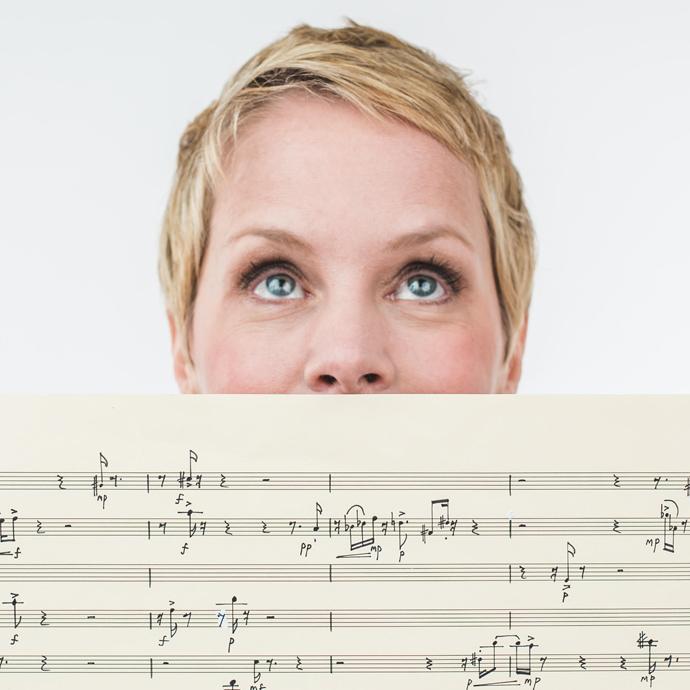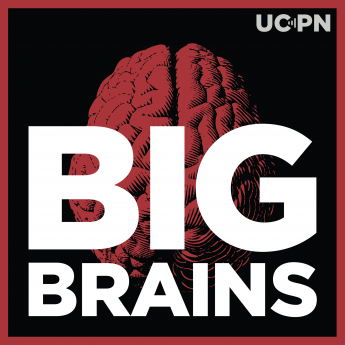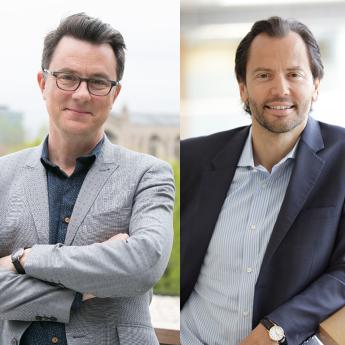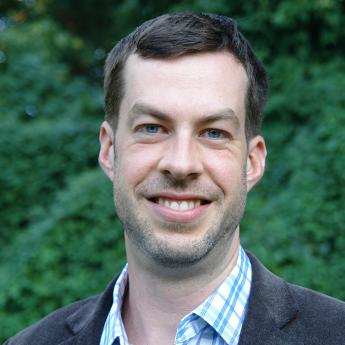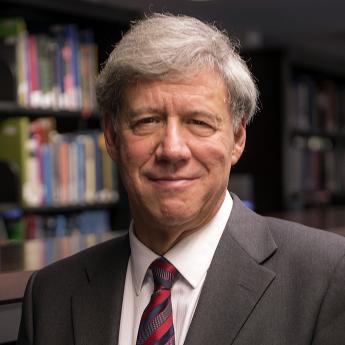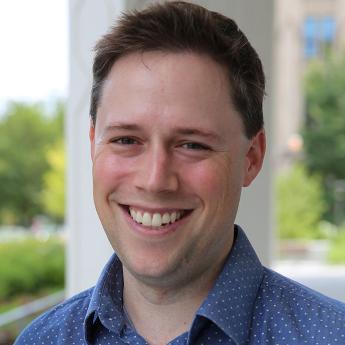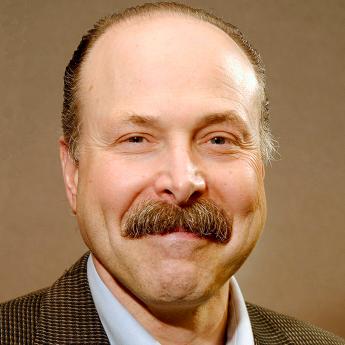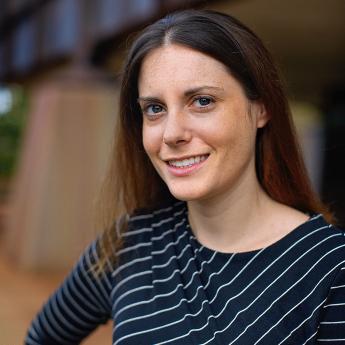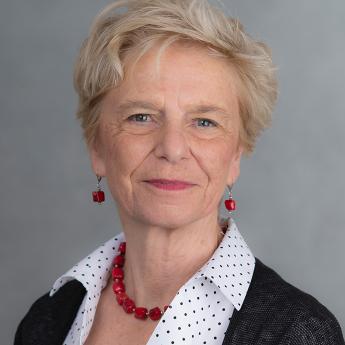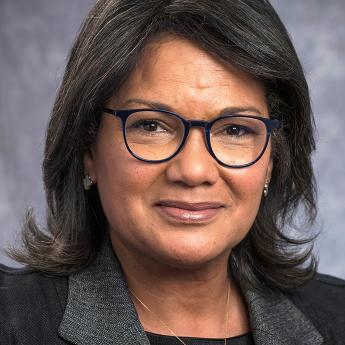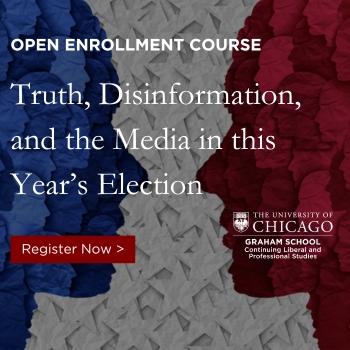Show Notes
To say Prof. Augusta Read Thomas is prolific feels like an understatement.
A past Grammy Award winner and finalist for the Pulitzer Prize in Music, Thomas has been hailed as “a true virtuoso composer” by The New Yorker, and her work has been performed more than almost any other living composer.
Subscribe to Big Brains on Apple Podcasts, Stitcher and Spotify.
Transcript:
Announcer: From the University of Chicago, this is Big Brains, with Paul M. Rand. Conversations with pioneering thinkers that will change the way you see the world.
Paul Rand: Is classical music really dying? Well, not according to University of Chicago composer, Augusta Read Thomas. Gusty, as she is known, is one of the most prolific classical composers living today. A Grammy winner, she has been hailed as a true virtuoso composer by the New Yorker and her music has been performed more than almost any other living composer. On this episode of Big Brains, gusty shares her thoughts on why classical music still matters and how she’s helping shape the next generation of composers.
Paul Rand: You really have achieved a great degree of attention and you won a Grammy award. It was a couple of years ago. You’ve been recognized truly as one of the greatest living and performing composers today. Why do you think those recognitions are coming your way?
Augusta Read Thomas: Oh, Paul, that’s a difficult question for me to answer. I’ll try to answer it. One of the things that makes it difficult is that I am in the trenches. I’m zoomed up everyday right next to my work. I get up super early. Work, work, work, work, work at the piano, sing, notate, proofread, make the recording, get on the airplane, teach a class, have all my private students at the University and go to their concert and then write another piece. I’m so in the trenches, it’s hard for me to zoom out and say, ‘‘How come my work is played all over the world?’’ Because I basically just get up and work. In that sense, I’m just a hard worker. On the other hand, what am I working hard at? And why is it that people like to play it and want to record it and want to tour it and want to commission me for more of it?
Paul Rand: Better question.
Augusta Read Thomas: And to a certain extent, that’s up to them. But I think that if I were to describe my own work, I work very hard to craft things extremely elegantly. I never take a shortcut. I never put a bandaid on something, ‘‘Oh, this isn’t working. I’ll just throw a bandaid on that and keep going.’’ It’s a very organic work. And if you change one note or something, it upsets me. Not in a way like you particularly, but everything was there for a reason. And it was sort of quote, unquote, beautifully worked out to be that. I think people really appreciate when they’re playing their notes in their orchestra piece or their part or their string quartet, they can feel, ‘‘I know exactly why this note is here.’’ I can feel it. I can embody it. I can play it. One comment I get a lot, at least 10 times a week from people on email and people I’m working with that are like, ‘‘Your music’s so much fun to play.’’ And it’s so interesting to me because that word sort of means just what it is, but I hear it from so many different people. They’re like, ‘‘This is so much fun to play. Oh, can we tour with this?’’ Or, ‘‘Can we put this on our album?’’ That kind of thing. And it’s just interesting to me. What is it that they’re enjoying? It’s very beautifully notated, very organized and that kind of thing. But I think really, fundamentally, I’m interested in artists that have a point of view and that have material. What am I saying in my pieces? What am I working with? And is that material transformative and very unique and my own slant on how music is for me today and understanding lots of different musical traditions, including people who don’t read music, which is 95% of the world are making music and don’t even notate it or read it. And then you have people who are like notating and then you have jazz artists and improvisers. And I’m sort of open to everything. And my own work is highly crafted, but I’m influenced by sounds of any kind. I think that people tell me that if they hear and Augusta Read Thomas piece on the radio, they’re like, ‘‘oh, that’s gusty.’’ Like six bars are like, ‘‘That’s Gusty. Got to be Gusty.’’ And in a way the same thing, I mean, that’s sort of [crosstalk 00:04:21]
Paul Rand: That’s true, by the way. As I was preparing to talk to you, as I began listening, you could hear it almost immediately. And there is a joy into it. There was a fun to it, even though there are certainly clearly some musicianship and some technicality, but the two seem to come together quite nicely.
Augusta Read Thomas: Yeah. I like the sense of pieces having a rhythmic flow or an inner life that is compelling and felt and embodied. So if you’re in the pocket with a piece and you’re feeling it, it sounds a little crazy, but it’s almost like the music is writing you. Of course, I’m writing it, but if I’m open to really feeling it and singing it and playing it at the piano, like I do all day long dancing it actually, it develops into something that’s true to itself, as opposed to, well, I have this tone row. And after this little thing, now that has to come in and then I have this algorithm for all my rhythms. So then those rhythms will come and it’s not heard or felt, and you don’t have the sense that, in the line, that it needed to go there. It’s that some outside thing said, ‘‘Now it’s time for this note or now it’s time for that.’’
Augusta Read Thomas: Or some sort of outside self-conscious thing. I think my music is, for lack of a better word, extremely naked. It’s just bubbling up and I want it to be truly itself. I don’t need to put lipstick on it or something. I know what the right words are, but there’s a real truth in it that is interesting for me because otherwise, what am I doing with my life? I’m working 16 hours a day. Why would I do that and work so hard unless I’m really digging deep and being willing to be vulnerable and true? And I was thinking also, mathematics. You have to think of these things and really work through them, some abstract way of thinking and find something. It’s not easy work, but on the other hand, when you’re inside of something, it starts to lead you down the path that it needs to go. And I would say that would be the same for poetry or even for architecture. Many, many things in life, even just for life.
Paul Rand: Right. Is there a piece that you’ve put together where that you think really kind of helps symbolize what you mean by that?
Augusta Read Thomas: I think if we were to just take, let’s say, the opening four bars. We’re talking 10 seconds or so of a string quartet I wrote called, ‘‘Chi,’’ C-H-I, meaning life force and just look at the first movement.
Paul Rand: Fantastic.
Augusta Read Thomas: So what you hear there is this line in the violin and then the other instruments are pizzicato-ing. And if you just hear the violin line alone, if you can subtract out the pizzicato in your mind for a second, it could be like a jazz saxophone improvising, or it could be a violin playing a line like that. It’s also fully animated, like the train has left the station. Voom. It just dives right into itself. So I’m just improvising around it. But you have the sense of these pizzicato poking the sound and this line is 1, 2, 3, go, here we go. So by the time you’re in bar five, the rollercoaster is rolling. And I like that immediate energy. It’s sort of arresting like here we are. And now we’re in bar ten and already, a lot has been covered. And the fun of playing that also.
Paul Rand: It sounds fun to play.
Augusta Read Thomas: And also, of course, then when you start to unpack that, ‘‘what am I doing harmonically, what kinds of chords am I outlining? Do I have upper voice setting? Do I have lower voice leading? What are the color shifts that I’m making? How have I divided the ensemble between each other? What strings are being pizzicato on? What kind of bowing I want?’’ So, does it start with a down bow or an up bow? These subtle things that really just are completely important to me. And so for instance, another quick example, it with a note and then the note’s repeated. So, that little repeated note, I think that’s a great note. It’s like if you were dancing and then you have to do this little tiptoe before you go up.
Augusta Read Thomas: It’s just a little jig. It’s only the second note of the piece, but a tiny thing like that gives immediately by the third note, there’s a kind of energy flow going. In addition, this opening that the violin plays has got a lot of silence. It’s all full of light and bubbles and lifting of the bow and pizzicatos fitting in there. And so, it took me a long time to write it. It ends up sounding just natural, which is what I like. I like people to just set up my pieces. Hopefully they sound like they just inevitably pop off the stage. But behind backstage, there’s a lot that goes into polishing something so that it can be imbued with that kind of vivacity, color and sparkle.
Tape: He grabbed something in the human imagination whenever whoever told the first story, told it.
Tape: Yet, this is what writing is a leaving behind.
Tape: Let me say how happy I am to be here among my people, in the temple of the book.
Announcer: Insightful, observant, and recorded live in Chicago’s world-renowned seminary co-op bookstores. OpenStax brings you conversations with scholars, poets, activists, and more on subjects, as eclectic as the books on our shelves. Plus the latest in scholarly publishing and books of endurance with views from the co-ops venerable front table, join the conversation at semcoop.com or wherever you download podcasts. OpenStax. Stay tuned, stay curious.
Paul Rand: If you had to say, we want to make sure that this art form stays as vibrant as a possibly can, what would you do to help impact that?
Augusta Read Thomas: When I think about my life, I am a composer. I’ve been writing music since I was a tiny little girl. And then I also-
Paul Rand: And by the way, from the tiny little girl, if I also remember you’re 10 of 10, is that right?
Augusta Read Thomas: That’s right. I’m a twin also.
Paul Rand: Oh my goodness. Okay.
Augusta Read Thomas: I think by the time I came around, my parents were like, ‘‘Okay, whatever you’re doing is fine.’’ Basically, an older sibling raised me because there were so many of us. And so, I used to just go and play piano. I liked the piano. It was my space and I made songs up and I would lie under it and listen to someone else play it. And of course, there was a lot of music in the house. Because somebody is listening to the Beatles and then, my father’s listening to Mahler and then somebody is listening to whoever. Crosby Stills Nash and Young or Simon and Garfunkel or something. And then I’m starting to learn to read music. So, it was a chaotic house obviously. And that’s a whole nother story.
Paul Rand: Yeah,
Augusta Read Thomas: That’s complicated. But in any case, so I am this composer for my whole life. But allied to that is teaching. This is my 25th year in University teaching or 26th. Long, long time. And in a way, I see them as two circles, but you can’t separate them because if I’m making music every day and then I come and talk to a student who’s making their piece, I have some experience with what they’re trying to do and I can help them a little bit. But it’s only because I’m writing every day and have been writing that I can be a good teacher. There’s that real sense of one of them fitting into the other. And one of the other circles I would draw into that ring so that all three circles are overlapping is Gusty the, for lack of a better word, citizen because I have worked incredibly hard for 30 years to do things for other composers.
Augusta Read Thomas: So for instance, I serve on lots of boards. I chair at the American Music Center board, which, is one little tiny sentence on my resume, but it was years of work. And I started the Music Now series at the Chicago Symphony Orchestra, which is thriving. And I ran a huge festival called Ear Taxi festival. And of course, now at the University of Chicago, I founded the Center for Contemporary Composition.
Paul Rand: Last year he founded that, right?
Augusta Read Thomas: Yeah. Well, I’ve been working on it and about a year and a half ago, I think we actually announced it. And we’re well into sort of the second year with it and that’s a big vision and that I can talk a little bit about, but my main point is that I could just do Gusty, sit and write my music, tour, do commissions and all that. But I really try to get in there and help other people and not only help them about their own writing, but help really get other people commissions, other people performances, build entities that bring this music forward. And one of the things that’s interesting to me is how does music get made? Because very often, you write a piece and you hand it in by FedEx or something and you show up and there’s a rehearsal and then there’s a concert and then it’s over and you really don’t get a chance to interact with the musicians. And one of the things I’ve built here at the University of Chicago are many contexts where we can work the process of making music. When I think of what does the profession need, I can identify a lot of things. And then I think, ‘‘Well, Gusty, just do them. Just get in there and do them.’’ Not that I have a lot of time, but I really try hard.
Paul Rand: So, you have a number of students here at the University of Chicago, if they’re referring back and say, ‘‘Well, what I learned, what changed in my approach by having Gusty as my professor,’’ what do you think they would say?
Augusta Read Thomas: Oh, boy. Well, I love my students and they’re actually very good friends of mine because when I sit with them every single week, year after year, and look at what they’re making, you really get to know someone. Especially when it’s my job to say, ‘‘I’m not sure this is as integral as it could be,’’ or, ‘‘I’m not sure this material is particularly interesting,’’ one has to be extremely constructively critical. And that’s what the students want. I know my students know, I will always tell them the truth. I never say, ‘‘Oh, your piece is great,’’ when I didn’t think so. I will tell them. And I know they value that. I also work hard on several things. I want them to know a lot of repertoire of all kinds. And by repertoire, I don’t necessarily mean notated pieces, but have a sense of a whole world of sound and so many people making sound.
Augusta Read Thomas: Even if you only listen to music and that’s all you did and you didn’t eat or sleep, you would hear like 0.0000000001% of like what’s been made.
Paul Rand: Right.
Augusta Read Thomas: So, I think it’s important for all of us not to listen again to the same pieces that we know and love all the time. I love the Brandenburg Concertos and the Vivaldi Four Seasons and so on and so forth. But I also find it very nourishing to hear new things. I think also with my students, I want them to really be themselves. I’m so proud that our fabulous University of Chicago does not have a house style. Some universities do.
Paul Rand: Right.
Augusta Read Thomas: And so, the students go and if you don’t write exactly that kind of music, you’re on the outs and the sort of the famous teacher is only doing that and you have to sound just like that person or something. It’s crazy.
Paul Rand: So we’re not going to hear student after student sounding like mini-Gustys.
Augusta Read Thomas: I would be devastated. I would consider myself not being a good teacher. What I always say to them week after week is be yourself. What feels right to you? Open up inside, take the risk to find something. And what’s wonderful, I have four dissertations coming right up. We’re premiering them in May.
Paul Rand: Wonderful.
Augusta Read Thomas: And so, I’ve been seeing them like nonstop and they’re fabulous people. And their pieces are so different and they are so them. And I feel that when I write letters of reference for them, which I do all the time, I can say, ‘‘This person does this and that’s their thing.ְ’’ And it’s so powerful that that’s what they’re doing. These composers are throwing out a pedal into the world of what they’re making. You know, in other words, they’re not sort of copying something else.
Augusta Read Thomas: They’re just putting forward their take on sound and I admire them for that. I think also, I would use the analogy of all these rivers of sound crossing. When you think back to the jazz history and the classical history and if you go to the record store, they’re in two separate bins, but you come forward and those are all mixed up now and so on and so forth. So I think for them, understanding their traditions, what are their grandparents, what are their influences? Where are the perfumes in their music coming from? Are they being integral to them? Are they taking it far enough? Are they being courageous? Are they-
Paul Rand: Those are very penetrating questions that there are not easy answers to. They’re going to have to really think about them, aren’t they?
Augusta Read Thomas: Right. And we get into long discussions and also, are you being derivative? Sometimes I’ll say to a student because I sit on all these juries and all these things that I do. I’ve said, ‘‘Well, I’ve heard that piece 50 times. You think you’re being new and fresh and inventive, but frankly, if you’ve been around the block, you’ve heard it. It’s really not inventive. So you need to go study all this repertoire and figure out what you need to say.’’ And usually, they get it right away. They agree because it’s clear.
Tape: The vast majority of the folks I worked with in the jail needed something else than incarceration.
Tape: How can we ask parents or caregivers to do the hard work of taking care of a sick child, which is the scariest thing in the world, while starving?
Tape: Then you really have a way of having science and policy come together in a way that really speaks to the magic of cities.
Announcer: From the University of Chicago. This is Knowledge Applied, a new podcast where we’ll go inside the research reshaping everyday life. In our first season, meet the experts who are digging into some of the toughest questions facing cities today. Subscribe on Apple iTunes, Stitcher, or wherever else you listen to podcasts.
Paul Rand: As you think about the future of contemporary classical music, what do you see and what do you hope that, if you look back in another 30-40 years, will have been accomplished?
Augusta Read Thomas: Well, I think that the future is bright and maybe I’m being naive because I’m in this field, but a couple of thoughts. Number one, players want to play. There are, I don’t know how many, 28 flute players coming up from Indiana University every year. And 32 from Michigan and if you add them all up, there’s a thousand flute players graduating every year and oboe players and violin and piano and singers. They want to play. And you see all of these groups doing concerts, they’ll do them in any small venue. In a bar, in a space of religious worship or even in the subway. They want to play. And so, there’s this enormous energy from the players that you can’t suppress. And also, they’re good. The technical level of these people coming out of all these amazing programs is staggering.
Augusta Read Thomas: They can really, really play. So that’s one thing. Then there’s people that want to compose and lots of them. And that’s fabulous. And I think that composing is a little bit different because it’s very hard and it takes a long time to get good at. And it’s also very hard to do well. So, I think sometimes people start as composers and then they stop because they realize, ‘‘Oh my goodness, this is just so difficult.’’ But so anyway, you have this energy from the players, you have this energy from the composers, and if you just take that, well, then we’re already in with a good chance. Then the question is, how do we fund it? Do the funders have vision? Do we have enough money to do it well? Or are we always sort of scrapping it together?
Augusta Read Thomas: And how do we tell the audience that it’s happening to bring them there? That’s another set of layers. But if the first two layers aren’t there, artists who want to play and composers who want to write then we’re really sunk.
Paul Rand: But that’s not even anywhere near the case.
Augusta Read Thomas: Not even near the case. So I think what we need is visionaries who have big dreams that can also connect the people who have the resources to the vision. Because for instance, musicians need to eat, they need to be paid. You need to pay for rehearsal time because otherwise it’s literally, ‘‘You guys all rehearsed at home and then we’ll run together and then we’ll do a concert.’’ That’s not a good way to become an exemplary group. And so, the idea of the group that we have here, the Grossman ensemble, they’re going to play together a lot.
Augusta Read Thomas: They know how to play together. They’re excellent at this. It’s very different than a pickup group. ‘‘Oh, we need a flute. Call that one. We need an oboe. Yeah. That one will be fine. Put them together, Wednesday rehearsal. Thursday’s the show.’’ Everybody will do it, but it’s not the same kind of experience. So I think that if we could just have contemporary classical art, music, have significant funding. And I was thinking, for instance, of course, I don’t know anything about money, because I’m a composer. That’s not really my focus on life, obviously, or else I wouldn’t be doing what I’m doing. But if we do think of money, like Google or Facebook or Warren Buffet or something, if somebody says, ‘‘Okay, I’m going to devote $500 million to contemporary classical music in America.’’ That’s a lot of money. I am aware of that. The entire culture would change. I mean, it would be such a transformative gift that’s so needed.
Paul Rand: The entire culture of the industry?
Augusta Read Thomas: The ability that people doing great work could be supported and supported in a way that they don’t have to have three day jobs and do all kinds of other gigs. They could actually get-
Paul Rand: This is your first official call off for a $500 million gift?
Augusta Read Thomas: I guess it is, but I’m just sort of talking randomly, but I think $1,000 here and $1,000 is great. It’s incredibly helpful. But I think that the amount of excellence and the amount of energy deserves significant funding but then you need leadership and then you need vision and then you need infrastructure and it gets very complicated. So you end up with this group asking, ‘‘Can we have a thousand dollars to play a string quartet concert?’’ And the other group is saying, ‘‘Well, we want to play our concert somewhere. We need $1,500. Can you all contribute $25?’’ It was just very homespun, which is great. That’s wonderful. There’s nothing wrong with that, but somehow I’m just, I have this vision that if the arts were supported in that way and our government doesn’t do that, as we know, and people will be there be for that factor or against. I’m not arguing anything political here, it’s just the fact. How do we really support this? And the Universities have been great patrons of the arts for very long time, but yeah, it’s very, very complicated. And then how to market it. I don’t have the answers. I have a lot of questions and a lot of energy to try to help, but it is exhausting, too, to always try to be making everything better for everyone, which I love to do, but it’s intense.
Paul Rand: It is intense. That’s a good thought to leave on. Thank you.
Augusta Read Thomas: Thank you.
Announcer: Big Brains is a production of the UChicago podcast network. To learn more, visit us at news.uchicago.edu and subscribe on iTunes, Stitcher, Google play, and wherever else you get your podcasts. And if you liked Big Brains, you might enjoy another UChicago podcast, Knowledge Applied. Taking you inside the research, reshaping everyday life. Thanks for listening.
Episode List
What Remains Unanswered After The 2020 Election, with William Howell and Luigi Zingales (Ep. 58)
UChicago economist and political scientist discuss the polls, what lies ahead for Biden and the country post-Trump
When Governments Share Their Secrets—And When They Don't, with Austin Carson (Ep. 57)
Scholar discusses the political theater of foreign policy—and the case for declassifying intelligence
How We Can Fix a Fractured Supreme Court, with Geoffrey Stone (Ep. 56)
Legal scholar examines how nomination of Amy Coney Barrett could tip an increasingly politicized bench
Correcting History: Native Americans Tell Their Own Stories (Ep. 55)
How scholars helped a Chicago museum rethink its representation of Indigenous peoples
The Future of Voting And The 2020 Election, with Assoc. Prof. Anthony Fowler (Ep. 54)
A leading political scholar discusses voting by mail, mobile voting and why he thinks it should be illegal not to vote.
Why The Quantum Internet Could Change Everything, with David Awschalom (Ep. 53)
A world-renowned scientist explores quantum technology and why the future of quantum may be in Chicago
The Way You Talk—And What It Says About You, with Prof. Katherine Kinzler (Ep. 52)
A leading psychologist explains how speech creates and deepens social biases
From LSD to Ecstasy, How Psychedelics Are Altering Therapy, with Prof. Harriet de Wit (Ep. 51)
A leading scientist explains the medical impacts of psychoactive drugs and the popularity of microdosing
How Can We Achieve Real Police Reform? with Sharon Fairley (Ep. 50)
Legal scholar examines whether civilian oversight, policy changes could increase accountability
Black Lives Matter Protests: Hope for the Future? (Ep. 49)
University of Chicago scholars examine the changing conversation around racial injustice and police reform
